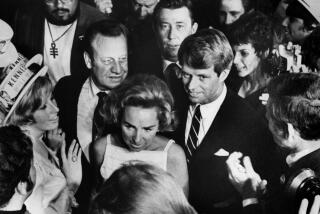THE SIMPSON LEGACY: LOS ANGELES TIMES SPECIAL REPORT : Twist of Fate / HOW THE CASE CHANGED THE LIVES OF THOSE IT TOUCHED : TRACY KENNEDY : Ex-Juror Has a Mission After Suicide Try
- Share via
The night before the Simpson verdicts, Tracy Kennedy appeared on Geraldo Rivera’s cable TV show and predicted the result: not guilty.
“I know these jurors,” Kennedy said. “I know how they think.
“The evidence had to be overwhelming, even beyond a reasonable doubt, for them to accept that he did such a thing,” Kennedy said. “When it’s a national hero, people just don’t want to believe that he could do such a thing.”
For nine weeks, Kennedy was one of the jurors. He was Juror 602, occupying Seat 3 in the courtroom. But in mid-March he was kicked off--for keeping a list of the other jurors’ names.
And then, on Memorial Day weekend, unable to cope with the sense of failure and depression that overtook him as a result of being dismissed, he tried to kill himself.
Kennedy swallowed more than 100 Xanax tablets, washed them down with a bottle of cooking wine and kissed his wife, Judy, goodby.
He also left her a note saying he was feeling badly as a result of having been on the Simpson jury and didn’t want those feelings to affect their relationship. The note went on to say that he loved her more than anything in the world and suicide was the only way he could see out. He signed it “I love you.”
Kennedy came to several days later at Verdugo Hills Hospital, waking up and announcing, “Damn. Failed again.”
From that hospital, Kennedy, 53, of Glendale, went to Las Encinas Hospital in Pasadena, a private mental health facility, where he spent a week and began to come to terms with his depression. Only in the wake of the suicide attempt did he come to understand that what he took for personal, irredeemable failure was a treatable medical condition.
Now, he said, things seem back to normal. He’s even back to work at Amtrak, doing his old job as a field instructor. “I’m much better,” he said. “I’m better for what I’ve gone through. I wouldn’t recommend it for anyone, but I think I’m stronger for it.”
Over the summer, Kennedy also decided with his wife, Judy, to try to turn the experience into something constructive--pledging together to speak out about the effects of sequestration, which he found demeaning and isolating.
“I think that’s one reason they didn’t deliberate very long,” Kennedy said of the 12 jurors who decided the case, reaching a verdict in just a few hours after being locked up together for nine months. “I knew there were a bunch of conscientious people in there. I felt it would really take some time and they would really go over the evidence.”
But, he added: “I think they wanted out of there.”
Kennedy said he was glad not to have faced the pressure of casting a vote himself. Although it “really felt bad at first” to have been dismissed, “I knew all the time [a vote] was going to upset 50% of the people.”
And if he had voted, he said, he’s not sure the verdict would have been any different.
“Deep in my heart, I think [Simpson] did it,” Kennedy said. “But I don’t think it was proven beyond a reasonable doubt. And under the law, you cannot vote, you cannot issue a decision for what’s in your heart or what’s your gut feeling. You must go by the law.”
More to Read
Sign up for Essential California
The most important California stories and recommendations in your inbox every morning.
You may occasionally receive promotional content from the Los Angeles Times.










